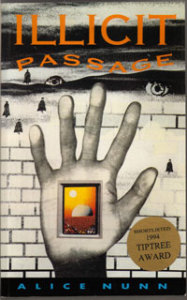Illicit Passage
This book, as originally published, was shortlisted for the 1994 Tiptree Award
When it was published in 1992 the book was considerably shorter. The publisher, Women’s Redress Press, wanted to keep it to 250 pages as the most economical way of producing a printed book and as a result a considerable amount of material was lost in the editing process.
After Women’s Redress Press folded, I came into possession of several hundred of the unsold books which were stored out in a shed where most of them went mouldy.
It seemed an opportune time to put it out as an e-book and while doing so, I went back through the old manuscripts and made a ‘Director’s Cut’ for the e-book edition.
I hadn’t read Illicit Passage for 20 years and I didn’t think I would like it. To my surprise, it made me laugh. Most of the time I assume it was meant to make me laugh. Occasionally the guffaws were as a result of the extraordinary acceleration of technology in the last two and a half decades. For instance at one point in the original edition when the power is failing and computer terminals now have to be rationed, someone goes to the stores and finds some substitute typewriters. Typewriters! Anyone still remember what they are? And if you do, when did you last see one? You might find one in a museum these days.
But apart from that, the book has held up extraordinarily well. At the point that I wrote it there were no e-mails and if there was an Internet I’d never heard of it. In the bureaucracy I imagined for 2104, bureaucrats send electronic memos, those with ties to the home planet send messages by teleposter, and my heroine burrows into the city’s information system and becomes something I’d never heard of while I was writing it in 1989, a computer hacker. Oh yes, and talking to a computer was a fanciful concept which could only be set in the very distant future! (I have just written this sentence using Dragon Voice Recognition software).
In fact the concept of the personal computer was very recent at the time I wrote the novel . One of the first affordable personal computers — an Amstrad —went on sale for $899 that year in an ad which read ‘Write the great Australian novel’. I thought, I have to have one of those! It had a memory considerably less than even the cheapest modern mobile phone today but I thought it was wonderful. I’d written my previous novella on a typewriter. Now with a computer I could correct at will, add chunks of text wherever I felt like — it really felt like the future!
I have added quite a lot of the original material back. It doesn’t add much to the progress of the plot but unleashes what one of the characters describes as the “tide of talk, the chat about people and events, scandals and titbits, this personality, that personality, all the background”.
I made a few other small alterations too; the main one being in relation to the heroine’s sister, a uniformly irritating 15 year-old. I have made her a bit less irritating — just because I can. And also because with the coolness of distance I can see maybe she did have something to complain about.
So, I present it to the world again. It is not quite the same as the book which was shortlisted for the Tiptree Award, being 30 or so pages longer. However the original dust cover blurb still pretty much describes it.
“The year is 2104 and the space colony of Anastasia Union is under siege. Systems are breaking down and sabotage is suspected. Food is scarce and the city is icing up. Bureaucrats direct men and money to the war in space while in the workers’ dome, women have developed surprising strategies.
However, that cheerful cup of tea and a gossip isn’t always what it seems.
Gillie chats with Big Barbara, Dorothy, Rita and Phoebe, the computers on the supposedly incorruptible security network. She is no cyberpunk hacking into the system but a new kind of hero, gleeful in her obscurity. She playfully outwits the authorities while disconcerting her conformist sister and confusing her revolutionary friends.”
This book available as an e-book on Kindle

